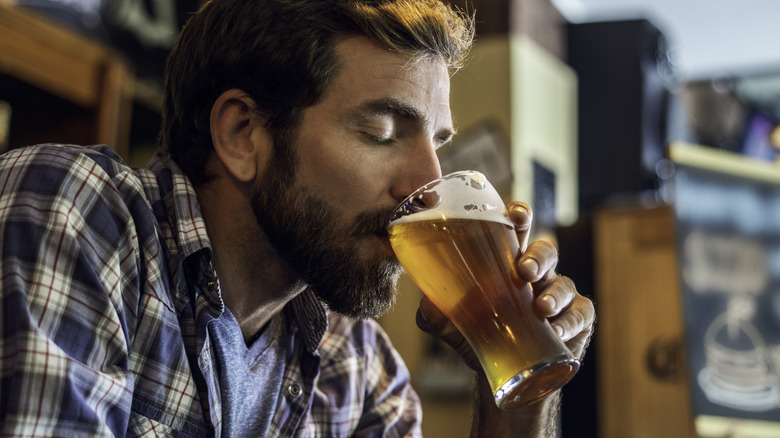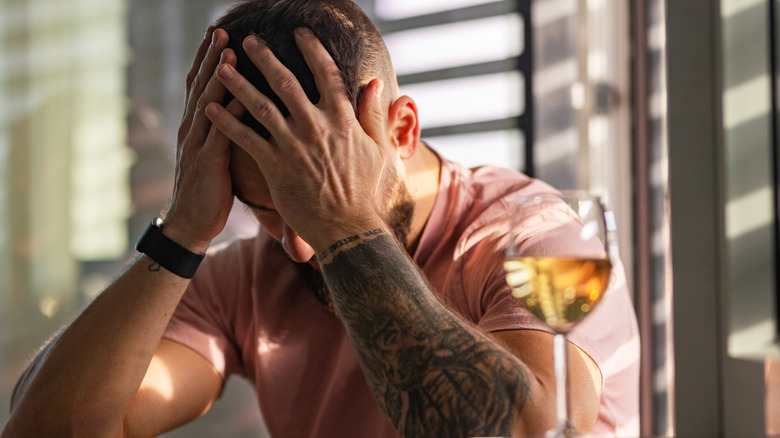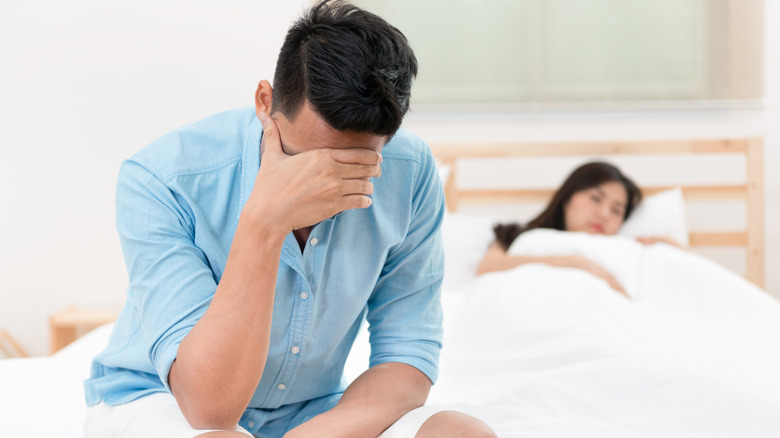Drinking Alcohol Has An Unexpected Effect On Your Testosterone Levels
A night of drinking can bring many laughs and unexpected behaviors, and a few drinks outside of the norm could make you feel a little, well, horny. You and your partner come home feeling in the mood until you realize that your guy down there isn't cooperating. Alcohol might make you feel aroused, but it's technically a depressant. That means the signal between your brain and penis becomes much more sluggish.
Alcohol not only blunts your ability to have an erection, but it also affects your testosterone levels, according to a 2023 review in Expert Review of Endocrinology and Metabolism. While light to moderate drinking may temporarily boost testosterone levels, heavy drinking significantly lowers them. Because alcohol is toxic to your body, your liver kicks into high gear to detox your system, resulting in elevated testosterone levels. However, binge drinking, especially on the weekends, can stress your endocrine system, causing inflammation, oxidative stress, and lower levels of testosterone.
If you or anyone you know needs help with addiction issues, help is available. Visit the Substance Abuse and Mental Health Services Administration website or contact SAMHSA's National Helpline at 1-800-662-HELP (4357).
How alcohol affects your hormones
You definitely notice the effects of heavy drinking the next day, as dehydration often welcomes your morning with a blistering headache. Depending on how much food you had in your stomach while drinking, you could also feel nausea that evening or the next day. Long-term heavy drinking can affect your brain, heart, liver, and pancreas, and the stress of alcohol on your immune system can result in chronic diseases such as cancer.
A more subtle effect you might not notice is alcohol's effect on your endocrine system. According to a 2014 review in Endocrinology and Metabolism Clinics of North America, alcohol increases the activity of an enzyme that converts male hormones into female hormones. Chronic alcohol consumption can cause liver disease, which lowers levels of the IGF-1 hormone. This hormone helps produce testosterone and boosts sperm production. Alcohol produces toxic metabolites that can damage your testes.
Signs of low testosterone levels
While a drink or two can temporarily raise your testosterone levels, this effect doesn't last long. Once the alcohol is metabolized, your testosterone levels will return to baseline. However, drinking a little more than two drinks every day can cause a steady drop in testosterone that will endure for several days. If you have alcohol use disorder, you might not see an increase in your testosterone levels until you're sober for three weeks.
Although a blood test can determine low testosterone levels, one sign of low testosterone is erectile dysfunction. You might also notice a drop in your libido, energy, memory, mood, and motivation. Because alcohol can affect your testes and testosterone, the size of your testes might be smaller. Over time, low testosterone could result in lower muscle and bone mass.
Alcohol might not be the only reason for low testosterone. Testosterone levels decline with age, but medical conditions such as obesity, type 2 diabetes, or obstructive sleep apnea can increase your risk of low testosterone. Using steroids, contracting an infection, or undergoing cancer treatments for your testicles can result in low testosterone.


